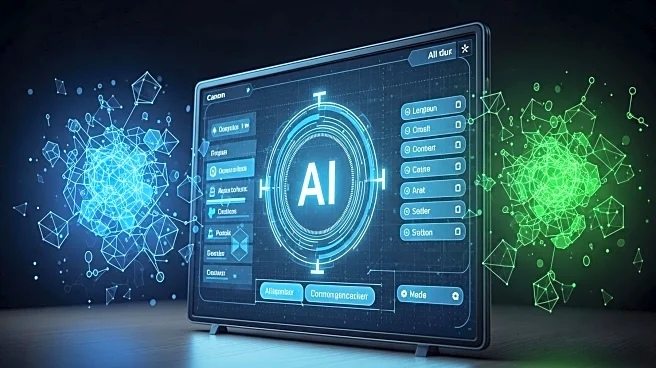What's Happening?
ComplexChaos, a startup co-founded by Tomy Lorsch and Maya Ben Dror, is developing AI tools aimed at facilitating consensus among groups, particularly in climate negotiations. The company recently trialed its tool with young delegates from nine African nations at a United Nations campus in Bonn, Germany. The tool utilizes Google's Habermas Machine and OpenAI's ChatGPT to generate questions, set conversation goals, and summarize documents, helping delegates arrive at a consensus before negotiations. The trial reported a 60% reduction in coordination time and 91% of participants felt the AI tool helped them see perspectives they might have missed.
Why It's Important?
The development of AI tools like those from ComplexChaos could significantly impact how international negotiations are conducted, particularly in areas like climate change where consensus is crucial. By reducing the time needed for delegates to reach agreement, these tools could streamline negotiations and potentially lead to faster implementation of policies. This could benefit global efforts to address climate change and other sustainability challenges. Additionally, the application of such tools in corporate strategic planning could enhance efficiency and decision-making processes across industries.
What's Next?
ComplexChaos plans to pitch its cooperation tool to tech companies and large consultancies, aiming to streamline strategic planning processes that typically take months. The startup is particularly focused on climate negotiations, hoping that AI can simplify and expedite these processes. As the tool gains traction, it may see broader adoption in various sectors, potentially transforming how complex negotiations are handled globally.
Beyond the Headlines
The use of AI in facilitating consensus raises questions about the ethical implications of machine-driven decision-making. While AI can enhance efficiency, it is crucial to ensure that minority perspectives are adequately represented and that the technology does not inadvertently bias outcomes. The long-term impact of AI on diplomatic and corporate negotiations could reshape traditional methods, emphasizing the need for careful consideration of its role in decision-making processes.












